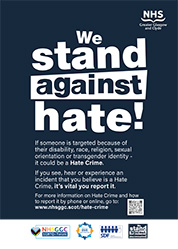What is a Hate Crime?
Hate crimes are crimes that are motivated by prejudice of some kind. These are crimes where the victim is targeted because they are a member of a particular social group or have a particular characteristic, which the perpetrator has negative views or beliefs about. The legal definition is:
“Any crime which is understood by the victim or any other person as being motivated (wholly or partly) by malice or ill will towards a social group.”
With the introduction of the Hate Crime and Public Order Act (2021) in April 2024, the law recognises crimes motivated by prejudice based on someone’s:
- Age
- Disability, including physical disability, learning disability and mental health difficulty
- Race (including nationality, ethnicity and skin colour)
- Religion
- Sexual Orientation
- Transgender Identity
- Variations in Sex Characteristics
These groups suffer disproportionately as victims of harassment and crime and much of this is motivated by prejudice. In addition to the effect on the individuals experiencing the hostility, these incidents create mistrust and suspicion between communities. This makes hate crime an issue for every service and every community.
Everyone has a role to play in stopping hate crime. If an incident is perceived by the victim – or any other person – as being motivated by prejudice or hate then it should be reported as a hate crime.
Watch the following video for more information.
Reporting Hate Crime – everyone’s business
Help & Support for Victims
Many hate crimes go unreported for a number of reasons.
- For many people, exposure to abuse is a life-long experience and not perceived as crime.
- Some people may know the perpetrators and be frightened of the consequences of reporting. They may even be suffering at the hands of people claiming to be their friends.
- Some people may have a fear or mistrust of the police. Others may have previously reporting a hate crime but feel it wasn’t taken seriously.
If you are in a position to talk to people who may be at risk of hate crime then ask the question. Many people will want to be asked but are never given the opportunity to disclose.
If someone discloses a hate crime to you there are steps you can take to support that person to make a formal report even if they don’t want to be identified.
If you witness a hate crime you can contact the police and report it. This can also be done anonymously
How to Report a Hate Crime
If it’s not an emergency (if there is no immediate risk to the wellbeing of the individual) you can call 101 and make a verbal report to the police.
You can also report a Hate Crime online by going to https://www.scotland.police.uk/secureforms/hate-crime/
The form can be used by anyone who
- is the victim of hate crime
- has witnessed a hate crime, or
- is reporting the crime on behalf of someone else.
Hate Crimes can be reported anonymously. If you are working with a patient or client who does not want to give name but wants you to support them to report it you can assure them of their anonymity.
This may mean Police are restricted in the action they can take, but just reporting a perceived offense will allow Police to target resources to a particular area so you may see things like an increased police presence.
999 should be called in any emergency.
Staff Datix Reporting
All Hate Incidents should be recorded on DATIX.
A Hate Incident field should be selected and completed under the category ‘violence and aggression’. Incidents are regularly reviewed by NHSGGC’s Violence and Aggression Team and any developing trends or ‘hotspots’ can be identified and appropriate interventions made. Local managers with reviewing and approval responsibilities will interrogate the Datix reports and ensure appropriate outcomes are achieved.
FAQs about Hate Crime
What is a Hate Crime?
Hate crimes are crimes that are motivated by prejudice of some kind. These are crimes where the victim is targeted because they are a member of a particular social group or have a particular characteristic, which the perpetrator has negative views or beliefs about.
In Scotland the law recognises crimes motivated by prejudice based on
- Age
- Race (including nationality, ethnicity and skin colour)
- Religion
- Sexual Orientation
- Disability, including physical disability, learning disability and mental health difficulty
- Transgender Identity
- Variations in Sex Characteristics
Do I have to give my name to make a report?
No you don’t. Hate Crimes can be reported anonymously. This may mean Police are restricted in the action they can take, but just reporting a perceived offense will allow Police to target resources to a particular area so you may see things like an increased police presence. If you are working with a patient or client who does not want to give name but wants you to support them to report it you can assure them of their anonymity.
Can I report a Hate Crime?
Yes you can. An online hate crime report is available at: https://www.scotland.police.uk/secureforms/hate-crime/
The form can be used by anyone how is the victim of hate crime, has witnessed a hate crime or is reporting the crime on behalf of someone else.
Will the police take me seriously?
Yes they will. Hate crimes are serious incidents and Police will respond appropriately.
Do I have to report at a police station?
No you don’t. You can report it online at: https://www.scotland.police.uk/secureforms/hate-crime/ or use any one of the many 3rd Party Reporting Centres in the Glasgow area. You can find your nearest 3rd Party reporting centre here: http://www.hatecrimescotland.org/report-it/centres/
The incident happened weeks ago…can I still report it?
Yes you can. If an incident is happening there and then, you need to call 999 and report it immediately to the police, but if it happened in the past you can still call 101 – the police non-emergency number and report it or go online and complete the hate crime reporting form.
What if I’m not sure if it is a Hate Crime?
It is not your responsibility to prove that a hate crime has occurred. It is the job of the police to gather evidence from a range of sources during their investigation of an incident. This includes CCTV footage, witness statements and forensic evidence.
The Lord Advocate has told the police that an incident must be investigated as a hate crime if it is perceived, by the victim or any other person, to be aggravated by prejudice.
This means that your perceptions are important. When you report a hate crime, tell the police that you believe it was motivated by prejudice and why you think that is the case. This could be about the language used at the time, things you have heard the suspects say in the past or that certain groups are being singled out in your street / building, etc.
Why do we need Hate Crime laws?
The Scottish Government Working Group on Hate Crime gives 3 reasons for having hate crime legislation.
- Research consistently shows that some social groups are proportionately more often victims of harassment and crime and that much of this is motivated by prejudice against those groups
- Hate crimes can cause more psychological damage to a victim than crimes that are not motivated by hatred, because the victim’s core identity is being attacked. This personalises the crime and can cause the victim a greater amount of distress.
- Hate crime is socially divisive. Such crimes need to be particularly condemned in order to avoid a situation in which the relevant group feels victimised as a group, with members in constant fear of attack. Prejudice against groups can lead to a number of consequences, ranging from fear of crime and inability to participate in normal social activities to paranoia and vigilantism
Staff Resources & Training
We Stand Against Hate – A3 posters and A5 leaflets encouraging hate crime reporting. Contain QR code link to the Hate Crime web page. For copies contact equality@ggc.scot.nhs.uk

Responding to Hate Incidents – An Employee Guide A guide for NHSGGC employees on the organisational position in relation to hate crime, what to do if you are a victim of or witness to a hate incident or if a hate incident is disclosed to you in the course of your work.
Hate Crime Reporting – E learning module The module covers topics such as types of hate crime, why hate crimes go unreported, why hate crime laws are needed and support for victims. Go to the Learn Pro home page and search for GGC 056 Hate Crime.
Hate Crime Awareness Session on MS Teams This short session gives participants an understanding of what hate crime is and how to report if witnessed in the workplace. It is an important safeguarding learning opportunity for all members of staff working in frontline roles. To view dates and to register, please visit our Staff Training page.
Active Bystander Training on MS Teams Promoted as part of our Stand Against Racism campaign, this training session provides skills to challenge unacceptable behaviours, including those which may have become normalised over time. Our anti-racism campaign is based on the words of our own staff from their experiences at work. To find out more or register for training, visit our web page.
Lord Advocate’s Guidelines: Offences aggravated or motivated by prejudice – LAG: Offences aggravated or motivated by prejudice | COPFS
Personal Safety As well as complying with our health and safety policies and processes, there are a number of things that staff can do themselves to keep safe. Tips include:
- Raising the alarm – if you are in imminent or immediate danger or a crime is in progress, call Police Scotland on 999. If a crime has already happened, report this to Police Scotland by calling 101. You can also report crime online on the Police Scotland Website. Most smartphones also have an inbuilt Emergency SOS feature – consider setting this up on your personal mobile.
- Be alert and aware of the people around you – avoid ‘autopilot’ and pay attention to your surroundings. If wearing headphones, make sure you are still able to hear outside noise. Keep your head up and out of your phone when you’re walking. Walk with purpose and confidence. If you receive verbal racial abuse outside of work, do not engage with the aggressor – continue progressing to your intended destination or to another place of safety. Take a description of the aggressor and note your location, date and time – this information is important when reporting to Police Scotland. If you receive physical abuse, attempt to maintain your own safety – you may have to use reasonable force to aid your escape.
- If you receive verbal or physical abuse in the workplace: verbal and physical aggression from patients and visitors should be managed using The Standards of Behaviour Protocol – as well as reported to Police Scotland and reported on DATIX. Violence Reduction Training is available across GGC to support staff at risk of violence and aggression.
Further reading and guidance:
- Keeping safe | Crimestoppers (crimestoppers-uk.org)
- Violence Reduction Service (Health & Safety)
- Violence Reduction Service – Toolbox Talks
- Lone Workers Personal Safety – Toolbox Talks.docx
- Violence Reduction Service – Education and Training
- Violence Reduction Service – Post-Incident Checklist
- Online Reporting Form | Police Scotland
Risk Assessment Where a member of staff or groups of staff report risk and request support – for example, if there is a heightened risk of racist or Islamophobia incidents – it will often be appropriate for their manager to conduct a risk assessment. These risk assessments can be useful to identify actions to that will improve the safety of staff, patients and service users and provide them with additional reassurance that we are prioritising their safety.
Some key tips
- The Health and Safety Executive advise on 5 Steps to Risk Assessment. The link Managing risks and risk assessment at work – Overview -HSE will support and guide staff on how to manage a risk, which will include verbal and physical racist attacks.
- The Generic Risk Assessment Template should be used to record the hazard, risks, controls and risk ratings relating to racist abuse.
- Reviewing the risk assessment is also crucial to ensure the controls remain appropriate to reducing the risk as low as reasonably practicable.
- There is risk assessment training available in the Training and Education link.
- Safety Health and Wellbeing Practitioners can support managers with this. You can find their contact details in this document: local Health and Safety Practitioner
Please note, it is important not to confuse a hazard and a risk as these are completely different. For example:
- A Hazard is – verbal racist comments from an abuser.
- Risk is – the abused is subject to mental health issues and fear of physical attack.
Reporting Hate Crime – what colleagues are saying
Kate Ocker, Chair of the Staff Disability Forum

We have to challenge prejudice and its consequences when we see them. Hate crime is not within our responsibility to dismiss. We must listen to victims. Too often I hear that experiences are minimised, and I will not accept that. It is not “part of the job” to be abused, or stand by when others are victimised. We are a diverse and amazing organisation, with such potential to arise and use that diversity for good.
We must challenge hate and overcome our own discomfort about “making a fuss”. Standing up for the vulnerable and the marginalised is not making a fuss, it is the foundation of a better place for us all.
Andrew Wyllie, Chair of LGBTQ+ Staff Froum

Hate crime has no place within our NHS. Our LGBTQ+ staff forum is committed to fostering an inclusive environment where all staff feel safe, valued, and respected. Any form of discrimination or prejudice is not acceptable and we are pleased to support the organisation taking a zero tolerance approach to hate crime. Let’s work together to create a healthcare system that truly reflects the diversity of our communities and where everyone can thrive.
Sajid Farid, Chair of the BME Staff Network

Hate crimes are a blot on the beauty of diversity that should be cherished. We must stand together against the forces of intolerance and bigotry, for only by showing kindness and empathy can we weaken the roots of hate. Together, we can create a future where every race is welcomed, every culture is honoured, and every heart is filled with love.
Ann Cameron-Burns, Employee Director

Nobody comes to work to face abuse because of who they are, what religion they follow, who they choose to love. I’m proud that we all stand together to stop hate. That’s the only way to eliminate it – give it no place to hide and grow.
Anne MacPherson, Director of Human Resources and Organisational Development

We all need to stand up to Hate Crime when we see or hear it. If left unchallenged it can take hold and undermine the great community we’re all part of. Our NHSGGC family is 40,000 strong. We can use that strength to make sure hate has no place in our workplace.
Alastair Low, Hate Crime Lead, Equality & Human Rights Team

It’s really important that people understand what a hate crime is so that when they see or hear it they can call it out and challenge it. We have the systems in place in NHSGGC to deal quickly with the perpetrators of hate crime so we can all step up and make a difference.
Jane Grant, Chief Executive

Many hate crimes go unreported due to fear, mistrust or not recognising that a crime has been committed. If we witness or experience an incident that we believe is motivated by prejudice then it is vital that we report it as a hate crime. This will ultimately help create a safer workplace and build stronger communities for us all.
